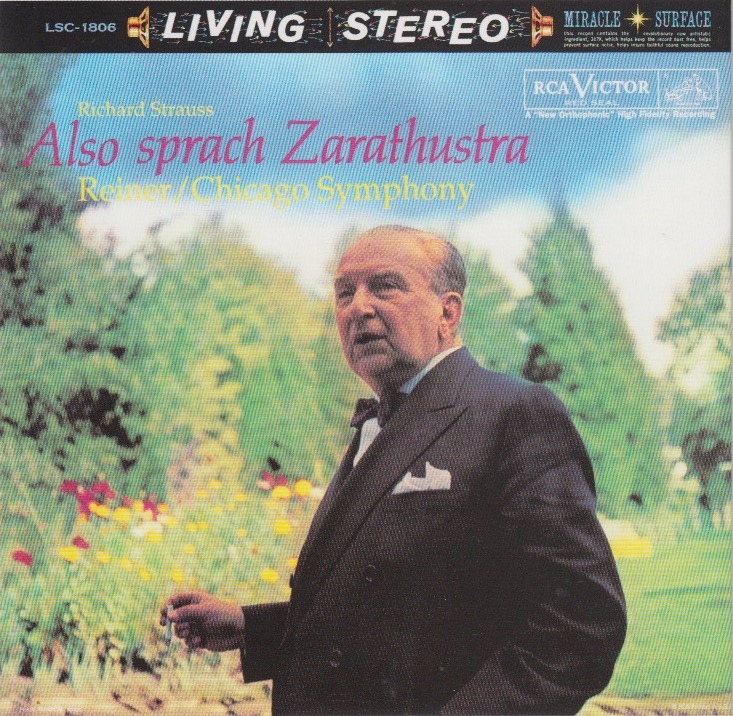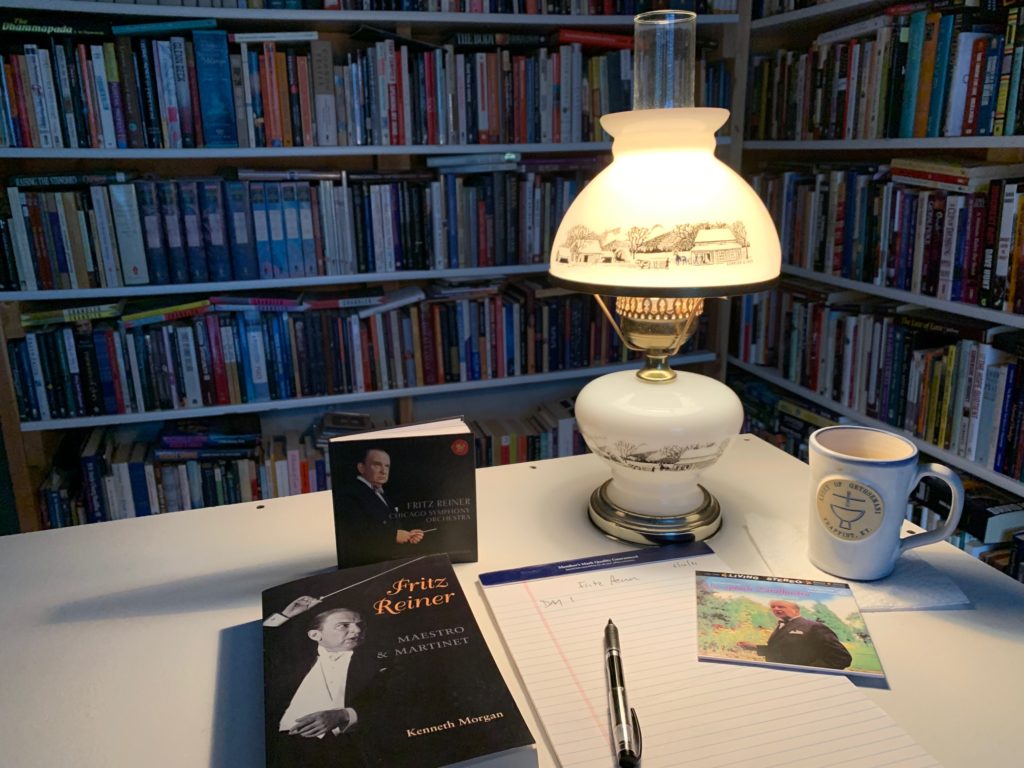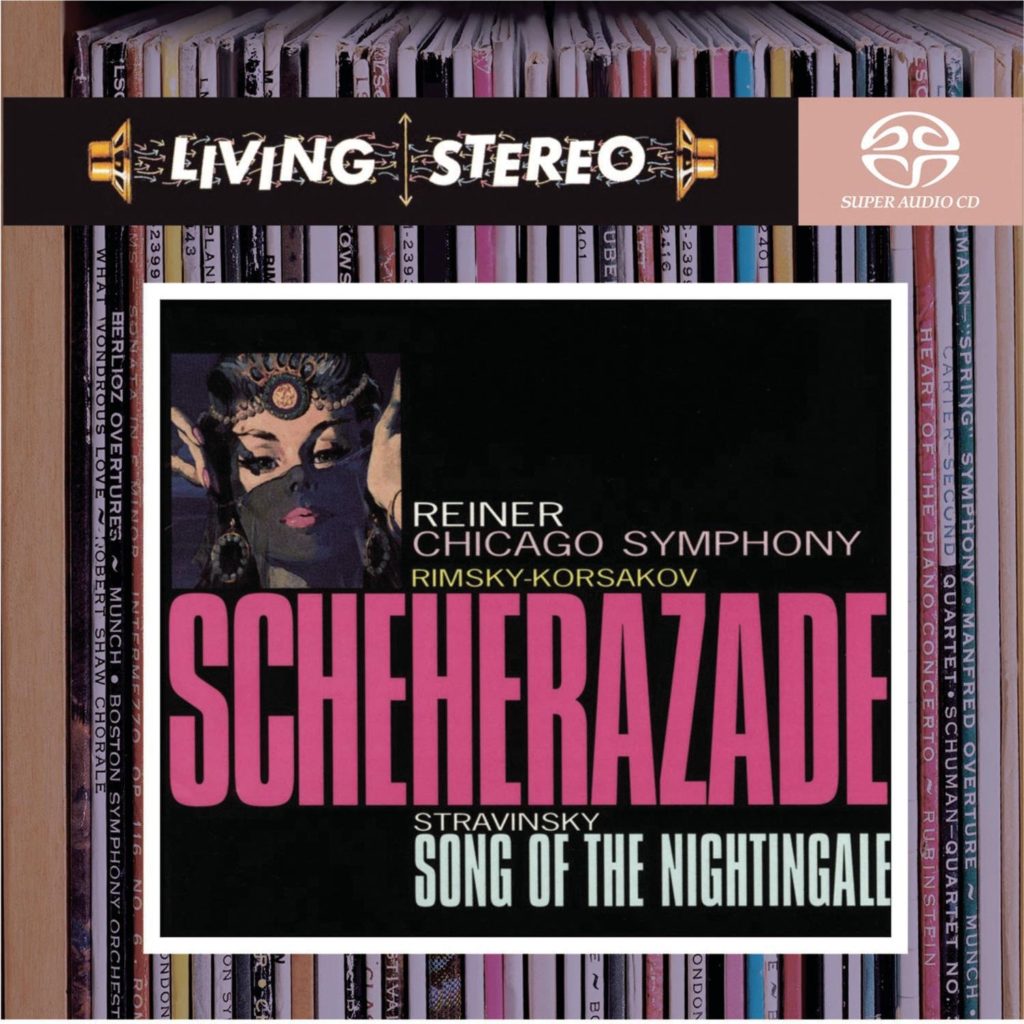
I love starting new projects, especially ones that involve listening to music. The potential for fascinating discoveries is quite high. Yet, so is the chance that I’ll hear a spellbinding performance from some musician, and find myself looking for more music from that person – which means these projects sometimes become even more expensive.
Be that as it may, today I begin a brand-new musical exploration, this time through the much-sought-after box set Fritz Reiner Chicago Symphony Orchestra The Complete RCA Album Collection.
My “office” this morning is not Panera or some other local eatery. I decided to try listening from my home office/library instead.
It hasn’t worked out as well as I’d hoped, though. Too many distractions. Too easy for me to jump up and grab a screenplay to edit, or feed the cat, or watch an episode of Supernatural (Sam and Dean ROCK!) with my wife.
Tomorrow, I will park my keister in a chair at Panera, at 6am.

I love listening to historic performances – and, by “historic,” I mean aged ones. They don’t have to be famous. Just very old.
This one may or may not be famous. And “very old” is a relative term. But 1954 is nearly 70 years ago. That qualifies as, at least, “old.”
Which means when I put on the headphones (or insert the earbuds), I will be transported back 67 years and imagine would life was like in the heartland of post-war America. For example, the Chicago Symphony Orchestra was almost 67 years old 67 years ago. (The first concerts performed by the newly formed Chicago Symphony Orchestra happened in October 1891, making the CSO 63 years of age at the time this concert was recorded.)
When I undertook my other projects, I would never know – as Forest Gump said – what I was gonna get. The recording could be incredibly crisp, or it could sound like it was recorded in a shoebox in the next room. Part of the fun of exploring these recordings is discovering how they were recorded. More often than not, I was amazed by the clarity of the recording – even from recordings dating to the 1940s.
This recording of Richard Strauss’ Also sprach Zarathustra is remarkably crisp, clean, and dynamic. Quite lush, in fact.
Every time I undertake one of these projects, I like to research the basics – who, what, where, when. That kind of stuff. For example:
The Objective Stuff
Also sprach Zarathustra was written in 1896 by Richard Strauss (1864-1949) and, according to its entry on Wikipedia, was “inspired by Friedrich Nietzsche’s philosophical 1883-1885 novel Thus Spoke Zarathustra. The composer conducted its first performance on 27 November 1896 in Frankfurt. A typical performance lasts half an hour.”
Strauss was 32 when he composed this work. Fritz Reiner (1888-1963) was 66 when he conducted it.
The Subjective Stuff
Recording quality: 5
Overall musicianship: 5
CD booklet notes: 3.5
CD “album cover” information: 2.5
How does this make me feel: 3.5
The original album cover approach is very cool in that I can see what others saw 50+ years ago when they held the album in their hands. However, reducing it to 25% of its original size to make it fit a CD also reduces the point size of the copy on front and back. Given that I’m getting older, reading such tiny copy is a bit of a challenge.
Even if I could read it – and I shall do so from now on with a magnifying glass in hand – I can see it doesn’t tell me what I need it to; namely, the track names and running times, the length of time for the complete symphony, the names of any of the performers, etc. As far as I can tell, I don’t even get to know the names of the performers by reading the small hardback book that comes with the set. Does anyone know if the names of the musicians are listed anywhere?
It bugs me if I hear, say, a really poignant piece on the violin and there’s no way for me to know who’s playing it.

For me, the most important aspect of the “subjective stuff” is “How does this make me feel?” It’s that aspect that makes the difference between a recording that moves me, that I’d want to buy if I heard it on the radio, and one that doesn’t move me that I’ll likely never want to hear again. Superb example of the former is Fritz Reiner’s Living Stereo recording of Rimsky-Korsakov’s Scheherazade, Op. 35, and Igor Stravinsky’s Song of the Nightingale. The second I heard Scheherazade on the local Classical radio station, I knew I had to have that CD. Whomever is playing the violin in that recording touched my soul with his instrument.
That was my first introduction to Fritz Reiner and the Chicago Symphony Orchestra.
And that’s why I bought the uber-expensive Fritz Reiner Chicago Symphony Orchestra The Complete RCA Album Collection, and why I started this project.
Yay, me!

I’m an audiophile and 74 years old. Been collecting records since 1964. Fritz Reiner and the Chicago Symphony have many great audiophile recordings. Simple microphone spacing, custom made tube Ampex 350 series tape machines and Lewis Layton was the engineer. The Golden age of high fidelity!
Thanks for your comment, Jeff.
I agree about some of the great recordings from decades ago. They sound fantastic. I listen to a lot of recordings from the great German conductors (Furtwangler, Klemperer, etc.), some of which were from performances in the early 1940s. For their age, they’re amazing.
The Fritz Reiner and CSO box set contains some gems.